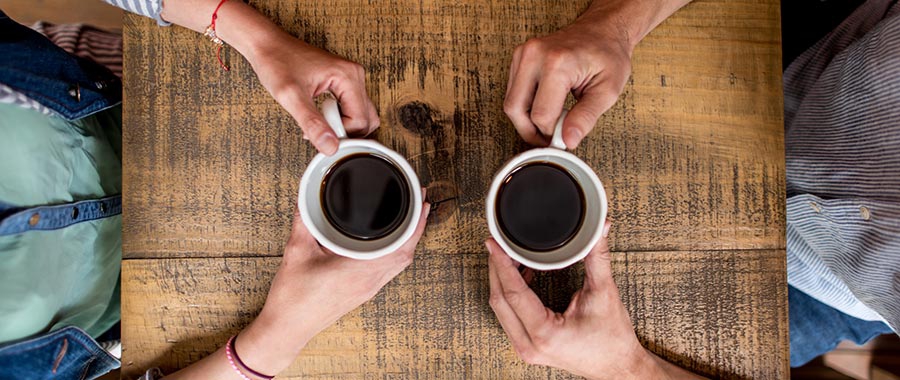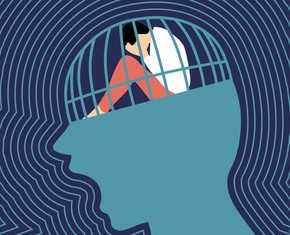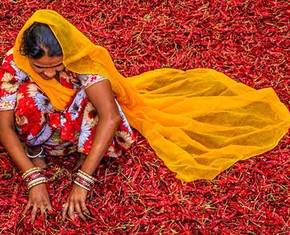The views expressed in our content reflect individual perspectives and do not represent the authoritative views of the Baha'i Faith.
My daughter and I visit in the Central Kavehaz (Coffee House) in Budapest. Those eyes I first stared into at birth a quarter of a century ago now look at me.
My eyes are filled with wonder. Hers are filled with determination and faith in her own competence and character. In the now twenty-five years since Andréana’s birth and only about a year since the passing of her mother in 2010, this young woman of exceptional character and accomplishment has succeeded in surmounting life’s challenges beyond her parents’ greatest hopes. But more important than success, she exhibits a character that we, as Baha’i parents, are asked by our faith to strive for in demonstrating to our children the path of outstanding service and dedication.
Andréana’s mother, Jacqueline, upon receiving her bachelor’s degree in education from a small university in far eastern North Dakota, immediately determined that her destiny lay far away from the more parochial life that her parents anticipated for her at home in their rural farming community. Learning of the need for teachers from the Victoria Teacher’s Program in far-off Australia, she set out for that distant land, never before having traveled abroad.
Six months after landing she moved on to the city of Perth in Western Australia, where she was exposed to the British method of education, especially as it applied to migrant and aboriginal children. What she saw she didn’t like. Justice and fairness were not prized values in that system. At this point in her journey of service, she came upon a like-minded faith community that went by the name of Baha’i.
Suddenly, what had been for her a vague sense of justice and service came into sharp focus.
I mention her mother’s experience because I see the pattern repeating in my daughter. An in-born sense of duty, service and a keen realization of fairness forms the substrate of my daughter’s life. Each generation, clearly, wishes for the betterment of their children, but most only assume that material wealth and possessions will bring this about. Each generation also provides a renewed opportunity for the rediscovery that true education and character development provides the best means for transcending the material world’s reliance on things to improve our lives. The Baha’i teachings ask us to:
Encourage the children from their earliest years to master every kind of learning, and make them eager to become skilled in every art—the aim being that through the favouring grace of God, the heart of each one may become even as a mirror disclosing the secrets of the universe, penetrating the innermost reality of all things; and that each may earn worldwide fame in all branches of knowledge, science and the arts. … Certainly, certainly neglect not the education of the children. Rear them to be possessed of spiritual qualities, and be assured of the gifts and favours of the Lord. —Abdu’l-Baha, Baha’i Education, pp. 27-28.
Now, so many years later, we sit as two adults discussing how life and her own endeavors have brought her to Budapest, committed to help better the lives of Roma (Gypsy) mothers and their children. She passionately discusses the difficulties and prejudices that continue to exploit and restrict the lives of Roma families in Europe, while I contemplate how her life’s trajectory brought her to this place and time. Her achievements are impressive, but the underlying development of her soul and character continues to occupy my thoughts.
As Andréana’s parents, we made a commitment to live our Faith’s guidance, no matter how awkwardly, in order to provide our daughter with a contrast, a living example of why a rich internal life provides a meaningful comparison to what material existence purports to offer. Baha’i parents have a deep spiritual duty and obligation to model for their children a life replete with spiritual values. In so doing, we impart to our children a pattern of character development that provides a moral and ethical compass, and a vision of justice, that helps to give definition to what God wishes for all of humanity.
O Son of Spirit! The best beloved of all things in My sight is Justice; turn not away therefrom if thou desirest Me, and neglect it not that I may confide in thee. By its aid thou shalt see with thine own eyes and not through the eyes of others, and shalt know of thine own knowledge and not through the knowledge of thy neighbour. Ponder this in thy heart; how it behoveth thee to be. Verily justice is My gift to thee and the sign of My loving-kindness. Set it then before thine eyes. – Baha’u’llah, Tablets of Baha’u’llah, p. 36.
Because Baha’is believe that the soul partners with human life at conception, it is a parent’s obligation to accept this trust from God and provide our children, from their earliest awareness, with the capacity to create a successful life.
While we, as parents and children, live bodily in this material realm, we are lost unless we strive for access to a consistent source of truth, irrespective of what the world attempts to tell (and perhaps sell) us. There is much good in the world if we can but find it; however, the truest source of rightness that can guide our lives and to which we can impart to our children only comes from the divine realm. Tapping into that source, and modeling for our children the behavior and wisdom that source expects of us, provides the real matrix for true education and spiritual development.
Many ideas rise up in the human mind; some of them concern truth and some untruth. Among such ideas those which owe their source to the Light of Truth will be realized in the outward world; while others of a different origin vanish, come and go like waves on the sea of imagination and find no realization in the world of existence. – Abdu’l-Baha, Tablets of Abdu’l-Baha, Volume 2, p. 301.
Soon, I will leave Budapest and my daughter to this world and all the difficult challenges it represents. As I do, I’ll take comfort in the thought that Baha’u’llah’s guidance, first introduced to her through her mother and me, like an ember growing into a flame, will continue to unfailingly guide her every action and step.
You May Also Like
Comments

















(‘Abdu’l-Bahá: The Promulgation of Universal Peace, pp. 144-145, 1982 ed.)